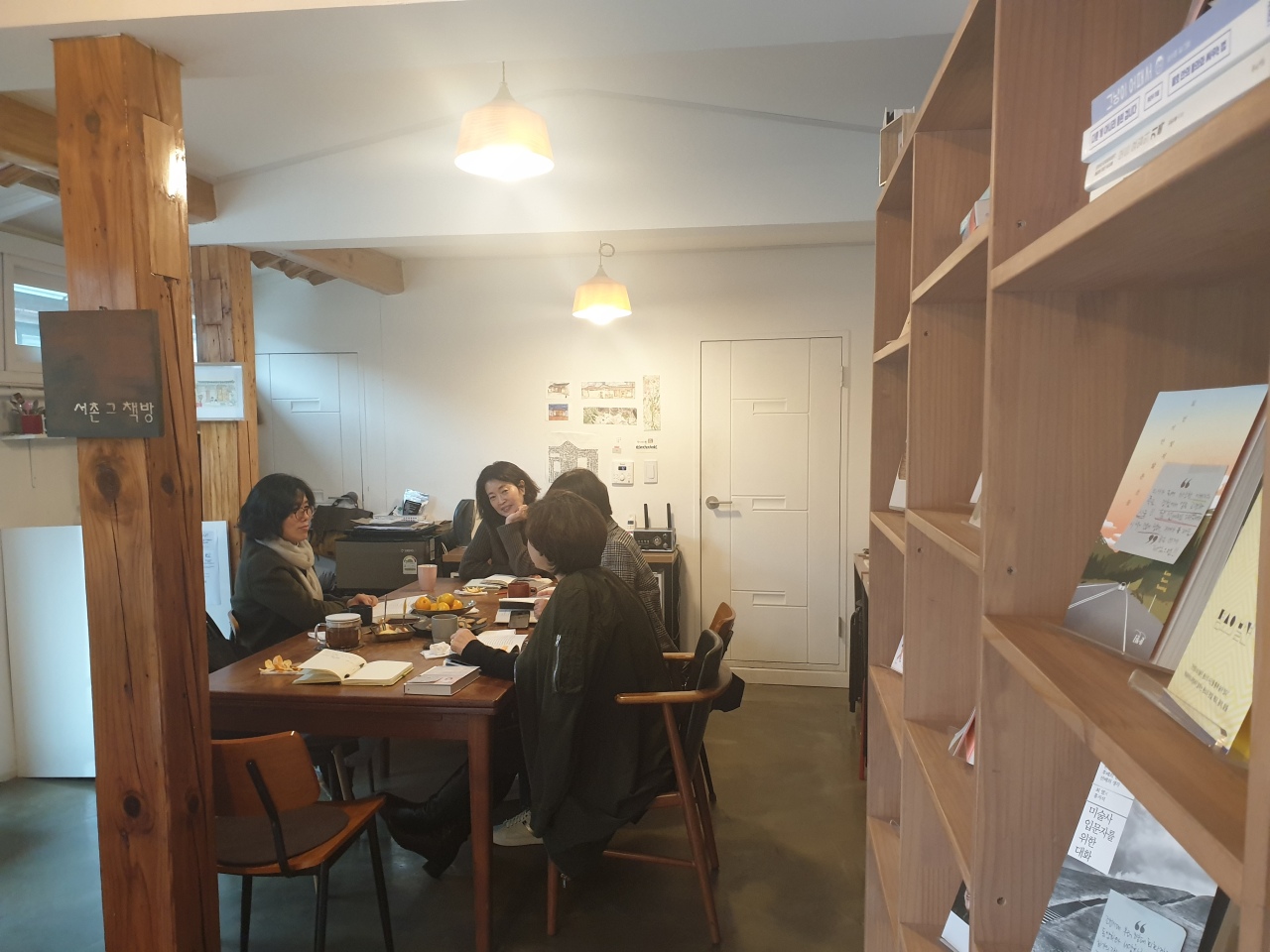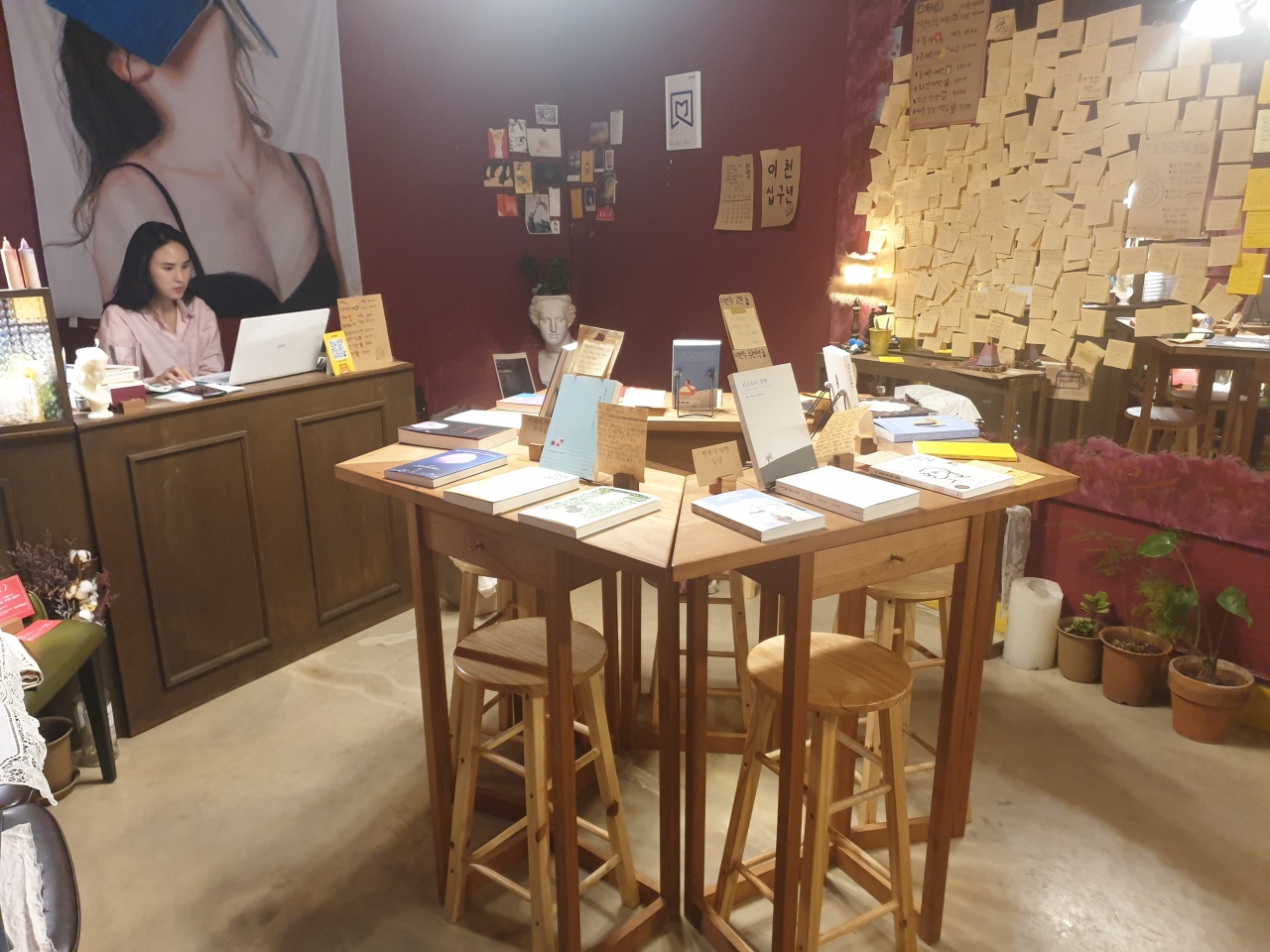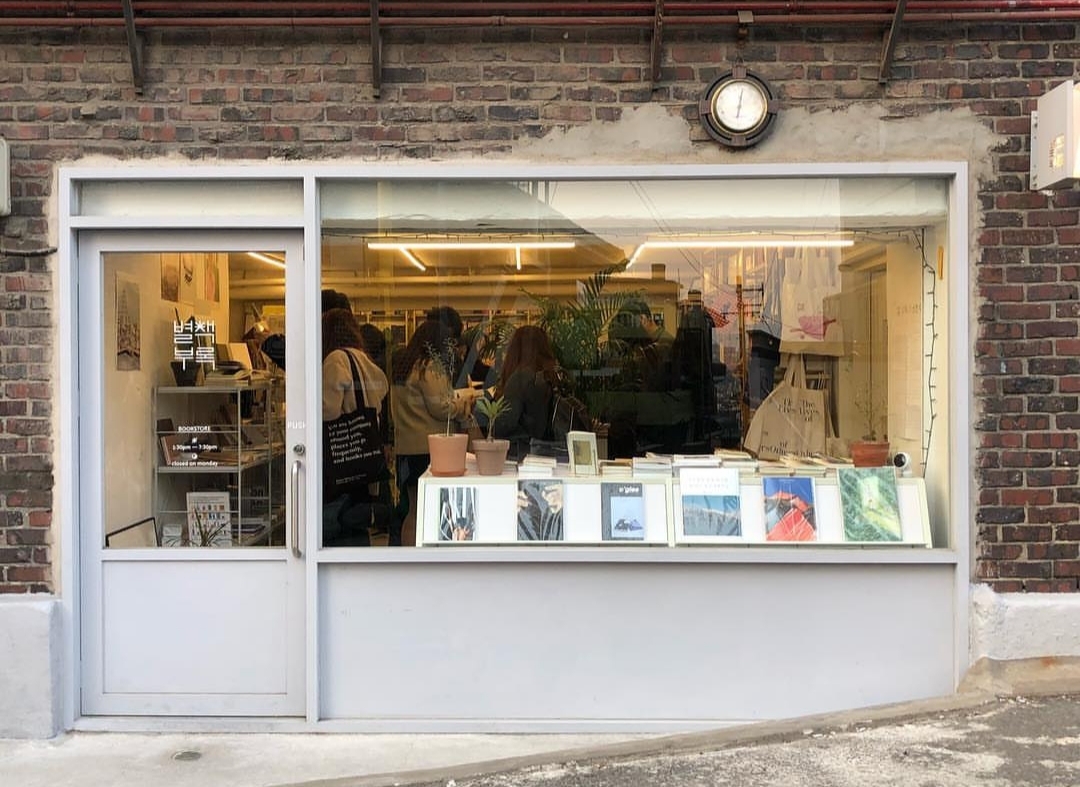People who get together for the monthly meetings at SeochonBooks, a small bookstore housed in a hanok near the palace Gyeongbokgung, may feel awkward at first. But soon they form friendships as they share their thoughts about a book that Ha Young-nam, the owner of the bookstore, recommends.
“I visit this bookstore every month. ... I have craved for communities where I could meet people, which have now mostly disappeared compared to the past,” said Jeon Ji-yeon, who is in her 50s. “What I like about this place is that although we are meeting for the first time, we can have a deep discussion -- and I think a book is the best medium for that.”
SeochonBooks is one of a number of indie bookstores that have grown popular over the past few years even as the book publishing industry declines. One reason behind the popularity of small, independently owned bookstores is the need for a sense of community.
 |
People gather at SeochonBooks to discuss books they’ve read over the past month. (Park Yuna/The Korea Herald) |
There are 134 indie bookstores in Seoul, accounting for more than a quarter of the city’s 444 bookstores, including franchise bookstores, according to the Seoul Metropolitan Library. The independent bookstores largely fall into three types: community-focused bookstores, specialty bookstores and those that mainly sell self-published books.
“The number of indie bookstores is growing,” said an official from the knowledge and culture division within the Seoul Metropolitan Library. “Local independent bookstores, which are small-scale and have unique personalities, have become a trend in Seoul.”
Kim Hyeon-jeong, 29, who opened The Present World, an indie bookstore in Dongjak-gu, two years ago, builds rapport with neighborhood residents by stocking books after reading the notes that visitors post on a wall inside the store.
“I categorized visitors’ concerns into five themes and order 25 books every month for each category,” Kim said. “Local residents become friends here at the bookstore and some of them stop by just to say hello -- and buy books.”
 |
Kim Hyeon-jeong, owner of The Present World, curates books every month based on notes that people post. One note reads, “Are you Happy now?” (Park Yuna/The Korea Herald) |
History Bookshop, a specialty bookstore in Jongno-gu, stocks mainly history books. The owner, Baek Young-nahn, a history major who worked at an IT company, quit her job and opened the bookstore two years ago. She thinks specialty curation is her store’s strength. She also hosts activities such as excursions for people who are interested in seeing historic sites around Seoul.
“People visit to read history-related books that are rarely found at franchise bookstores,” she said.
Having worked at an IT company for a long time, Baek got tired of the industry, where things change quickly, and realized that IT products are rather insubstantial.
“There is a basic human desire that online or IT things cannot satisfy. … Meeting people and flipping books are precious experiences that online platforms can never provide,” she said. “I think I was craving something tangible like a book.”
On a hilly street in Haebangchon, Yongsan-gu, Byeolcheck bookstore stocks self-published books. Eight out of 10 books at this small indie bookstore are self-published. The 6-year-old bookstore hosts sessions on how to write and publish books independently without consulting with major publishers.
 |
Byeolcheck bookstore, located in a hilly alley in Haebangchon, sells self-published books. (Byeolcheck bookstore) |
“A barrier to becoming a writer and publisher is much lower now, so self-publishing has been a trend for the past few years,” said Cha Seung-hyun, the store owner. “About 40 to 50 people on average visit the bookstore every day.”
-Unsustainable business-However, indie bookstores come and go. According to the Korea Federation of Bookstore Associations, four to five new indie bookstores open every month, but three others shut down.
“Indie bookstores are a difficult business,” said an official from the federation, who declined to be named. “Visitors are attracted by the unique personality of indie bookstores but some of them just take a picture to post on social media. … The popularity (of a bookstore) does not necessarily lead to sales.”
The profit margin, 30 percent, is also relatively small.
“Many of those who run indie bookstores hold two or even three jobs, and in my case, I barely manage to cover the rent and electricity bill, which is around 700,000 won a month,” said Kim of The Present World.
Indie bookstore operators say they typically face a crisis when their leases have to be renewed at the end of the second year. Unable to turn a profit, many of them choose to close their stores at this time.
Officials from the Seoul Metropolitan Library said the city government is aware of the need to support indie bookstores, but they need to define indie bookstores, as there are numerous kinds. For example, can a cafe that sells a couple of books be classified as a bookstore?
“We can’t neglect the trend of the growing number of indie bookstores,” said Park Jae-min, director of the library’s knowledge and culture division.
“Most independent stores are located in alleys because of cheaper rental. This allows for them to function as capillaries of Seoul, providing a sense of community for the people, which is quite important.”
By Park Yuna (
yunapark@heraldcorp.com)







![[Herald Interview] 'Trump will use tariffs as first line of defense for American manufacturing'](http://res.heraldm.com/phpwas/restmb_idxmake.php?idx=644&simg=/content/image/2024/11/26/20241126050017_0.jpg)


